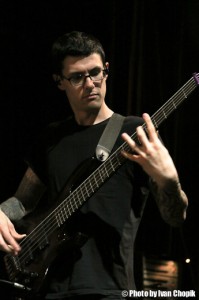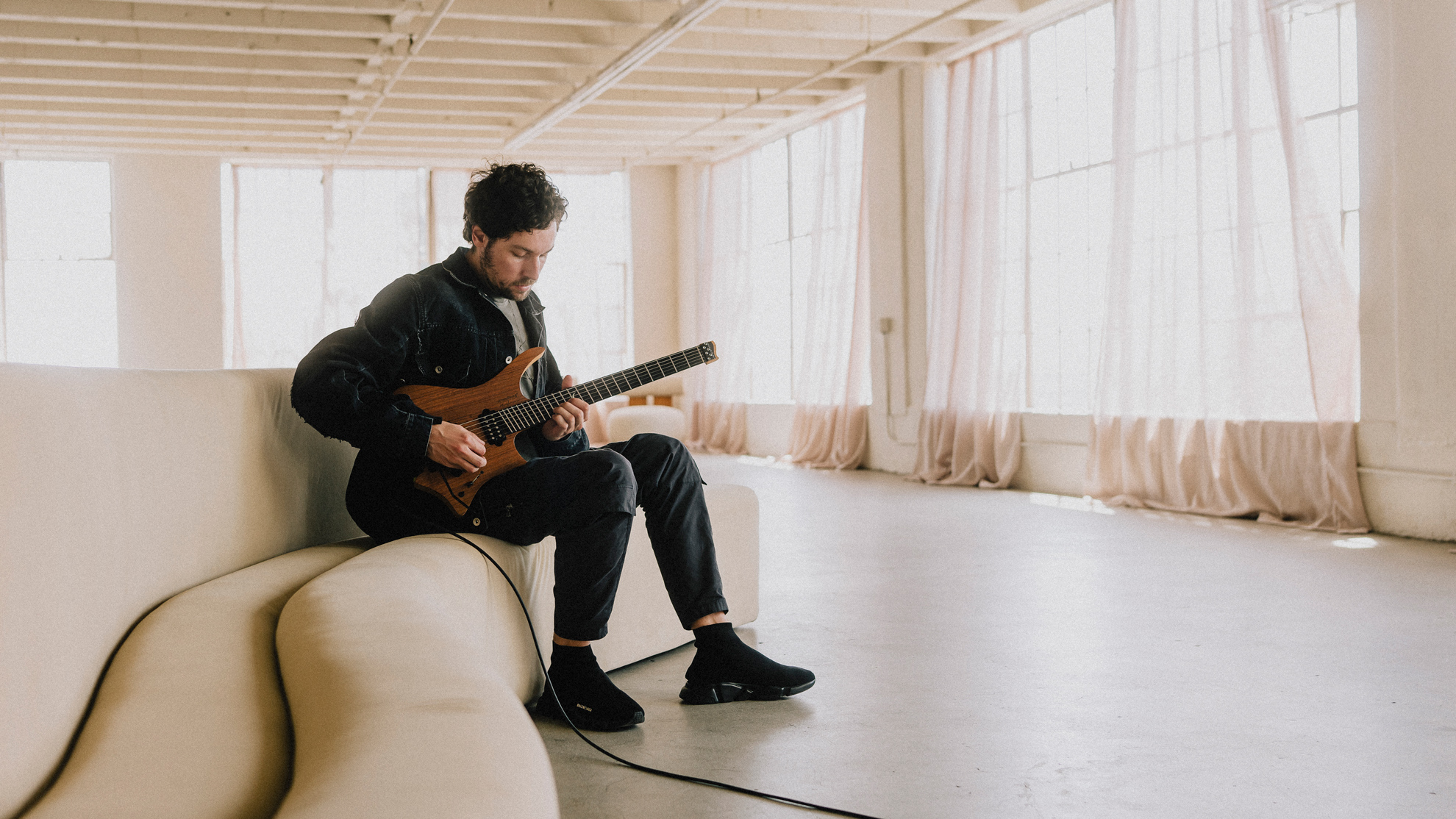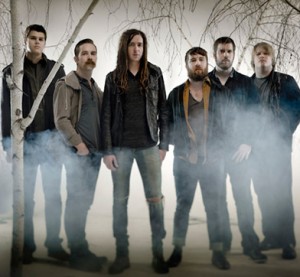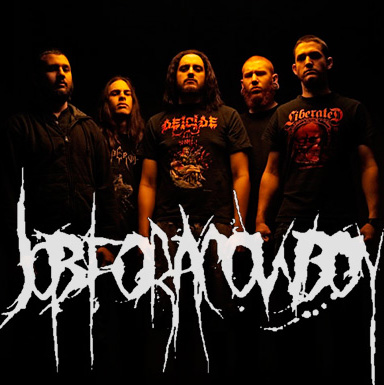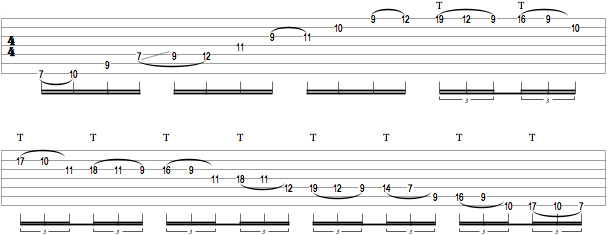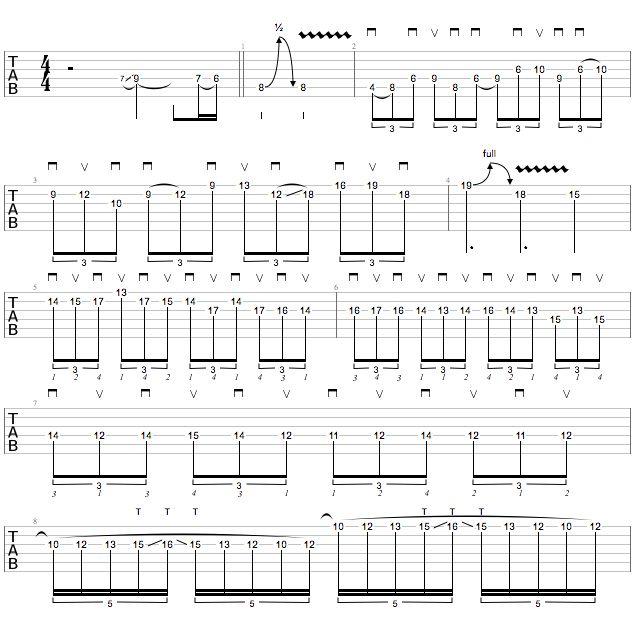PART 2 (continued from PART 1…)
I want to talk a little bit about your recording and production process. Your productions consistently feature some of the tightest and clearest guitar tones I’ve heard. I’m wondering how much of it is within the tone and the playing, and how much editing goes into it, as well.
MK: In terms of Faceless stuff, the more material I record, the less and less I try to edit, because I feel like you can hear it, and I try to get better performances. I’ve definitely gotten a lot better at dialing in clear tones. I guess it’s all relative, but tone, as you know, is obviously so much from your hands, and you can definitely hear from player to player someone who has good tone in their hands and someone who doesn’t.
It’s definitely something I’ve focused on a lot as a player, being a recording engineer and actually being able to analyze my playing in that way. A lot of players don’t have that at their disposal; to sit there and look at the waveforms that their hands create and look where they tend to lie on a grid in their groove and stuff, and I actually improved my playing based upon that and adjust my technique to the process of recording.
Like I said, my writing process is so much intertwined with recording. I feel like even my practicing process has become intertwined with recording. So yeah, I’m just seeing the sessions and then going, ‘okay, this is what I need to work on.’ I’ve learned a lot of tricks, I guess. I always DI everything first and then go back and find tones, and I feel like that’s actually been really important.
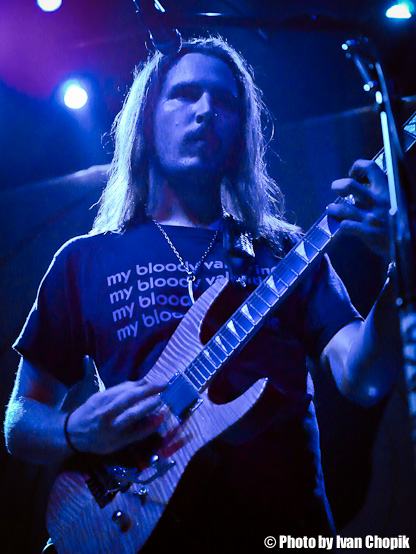
IC: If you have to edit, do you do the editing before you re-amp?
MK: Yeah, always.
IC: What about any EQ or compression while you’re still dealing with the DI?
MK: I try to just give a virgin signal and then that’s it. I try to just print guitar, and yeah, any editing that I do, I’ll make sure to do it all pre-re-amp, so the finalized track is going into the amp and then that’s what’s printing.
IC: Once you have your tones re-amped, do you do anymore cleaning up afterwards to get rid of some of the amp sound that comes back from the recording?
MK: Yeah, occasionally. It’s actually kind of cool to leave it sometimes, though, because it kind of gives it that natural feel, and sometimes, when you put it through an amp again, little things will come back that you thought were taken care of or whatever… sometimes it’ll come back with a little hand noise or a little click or something. Sometimes, I leave that stuff, as it gives it more of a natural feel.
IC: I feel like as far as clarity of tone, the first thing that people might reach for is just turning down the gain a little bit. What are some other tricks to get more clarity? Something I’ve really enjoyed throughout Autotheism is that you have these really dense chords, but you can hear every note pop out.
MK: Right. Well, like you said, turning down the gain. I always tend to play with a cleaner signal, generally, and I always try to not go overboard with saturation – I try to keep the tones pretty dry. Another big thing is mids, man. A lot of people are afraid to really give the mids hell, but guitar is a midrange instrument. That’s where its voice sits, so if you crank up the mids, that’s going to help a lot… just finding that sparkly spot.
I tend to go for punchier tones – things that lack the tube sag, that tube gushiness, which also in turn kind of gives you a scooped-mid effect a bit. So I usually go for the faster attack, more midrange dominant kind of tones.
IC: How hard are you picking to get the notes to pop out?
MK: You know, it’s funny. There are always these two schools of [picking]. I find myself adjusting all the time, from part to part. I’m digging in harder or softer from part to part, even intermittently within a part. I mean, I’m certainly not afraid to give it hell, occasionally. I’d say I probably lay into it a fair amount, but for speed picking, for instance, I am barely, barely even touching the strings.
IC: Really?
MK: Yeah, it’s all in the wrist, and I feel like the lighter you play, the clearer your transients are, the clearer every note’s articulation is, and so the faster I go, the lighter I’m picking.
IC: What kind of amps do you typically go for? I mean, we’re talking within the digital realm, but you’re still modeling some kind of real world tube amps most of the time, so what are some ones you reach for?
MK: I always go for the Marshall sounds. I find myself more and more steering clear of the heads that are just like this massive wall of sound. I’m going for that more traditional Marshall sound where it’s a little bit tighter, more controlled, maybe a little bit brighter, punchier, that kind of thing.
I’ve been using Waves GTR a bunch, and I’m getting pretty cool results out of that. That’s what I used on the new record, and then also, there’s some cool free stuff out there, too. LePou makes some really cool preamps of which there are one or two, in particular, that I really like a lot, so that stuff is all cool in terms of the digital plug-in realm.
Then, in terms of real amps, I still use my Randall V2 a lot. I like that head a lot – it sounds really cool. It’s got the solid state power amp punch, but it’s got a nice tube tone in the preamp, which is cool. The EVH 5150 III is really, really an awesome amp. I always just go for the more midrange dominant amps.
IC: I guess at the end of the day, it’s less EQ’ing that you have to do, because that’s where it’s going to sit in the mix more or less anyway, right?
MK: Yeah. It’s funny that you mention that, actually. This is part of the reason why I’ve become so stubborn about re-amping and picking the tones at the end. I try to not put any EQ on the guitar channels in a session, because I feel like I can always hear the EQ on the strip, and it bugs me. I feel like the second you put an EQ on a distorted guitar track, you’re just immediately degrading the sound. It’s not going to get any better, really, so I always just try and get the tone going in right.
| The Faceless – Accelerated Evolution (Official Music Video) |
IC: Do you find yourself high and low passing at all?
MK: Maybe going in, but I try to just leave it at that. Generally speaking, I don’t even really do that.
IC: What’s your guitar signal chain like for most of your recording?
MK: Well, I go just DI into my board. I have a Tascam DM-3200, which then converts into my interface, and that’s what I print. That’s the only thing I print, and then from there, there’s all kinds of stuff, but generally speaking, when I’m actually tracking, that’s it. It’s just the DI signal. I get as clean of a DI signal as I can off of the board, which has a pretty transparent sound, and I’ve got good converters and stuff, so it prints well.
IC: What about the DAW? What are you using?
MK: I use Digital Performer, which is not one of the more common ones, but I’ve been using it for almost 15 years now.
IC: I think that one’s a little more common in film scoring, right?
MK: It is. Yeah, it’s real common in TV and stuff, but you know, it does everything and, actually, what’s funny is that there are a lot of things that it did first. I hear people that use Cubase or Pro Tools raving about some new feature, and I’m like, ‘Digital Performer had that for 3 versions now’… but yeah, I like it a lot.
IC: What’s something you’ve never been asked before in an interview?
MK: I don’t know. I wouldn’t even be able to think of it, probably. I don’t know. You’ve asked me a lot of things in this interview I’ve never been asked before, so that’s cool.
IC: I’m trying.
MK: I can tell you a lot of things I have been asked before. That’s for sure. ‘So how’s the tour going?’
IC: Well, you’ve got to start off with that one. [laughs]
MK: Right, right, or I don’t know… there are a million stock questions that are like, ‘Uh, all right, so how’s the tour going?’ – ‘Good.’ Moving on… [laughs]
IC: What are you listening to?
MK: What am I listening to? I listen to all kinds of stuff all the time, but I mean …
IC: I’ve found it pretty common over the last few years, especially, to hear touring metal musicians say they don’t listen to a lot of metal.
MK: I definitely don’t. I definitely almost never listen to metal.
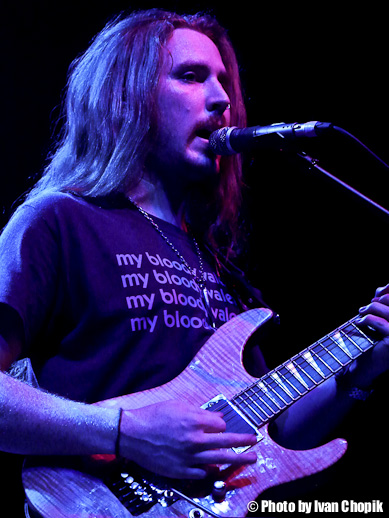
IC: I guess, you get your daily fix on tour?
MK: Yeah, totally. If I want to listen to guitar music, I’m going to put on, I don’t know, probably like Allan Holdsworth or Ricky Skaggs or something. I don’t know, something not metal… but honestly, I like listening to really simple music. I like listening to pop style music.
IC: Allan Holdsworth doesn’t fall into that category… [laughs]
MK: Well, yeah. No, not at all obviously, but I like listening to … it’s not necessarily simple music, but it’s kind of pop-esque – things like Steely Dan, The Doobie Brothers, Michael McDonald, Toto, Pages… stuff like that. I’m a big fan of industrial, as well; everything from Nitzer Ebb, 90’s era Killing Joke, to the more popular stuff, like Nine Inch Nails… yeah, all that kind of stuff.
IC: You’ve been at many different points of the industry; back when your band was starting out, getting local attention, getting signed to Sumerian, being the first band to resign with them…. What’s some advice you can give to young upcoming musicians in bands who are looking to make a mark in the industry?
MK: Well, the industry is changing dramatically right now, but as it currently stands, the model is still sort of in place. I would say one of the major things that has changed is that record labels – they’re in the business of selling records. They’re not in the business of selling local bands playing live shows. The best thing that you can do for yourself, is get yourself a good recording, because that’s what labels are looking for. They’re looking to know that they have a product that they can sell.
If you give them a sample of the potential product, that’s going to do you a lot better than trying to get out on the road and do it grassroots or whatever. That’s a way more sensible approach in this day and age.
IC: Seems that a lot of young bands are trying to get out on the road as fast as they can, whether or not there’s a good deal on the table for them to go out on the road. Do you think it’s a good idea for them to go out and do it anyway, just to start [moving forward]?
MK: I mean, if that’s what you want to do. If you’re just looking to have a good time – sure. It’s not really going to do much for your band, I don’t think, at least not in this realm… not in the metal realm. I mean, I feel like maybe like punk bands could still do that, but that’s a different thing all together. If you are looking to develop some sort of long-term career and be in a band that actually you can potentially treat as a job and make a career out of it, then start with a recording. I think that’s the most important thing at this point.
[Special thanks to Brandon Epling for his excellent camera work!]



